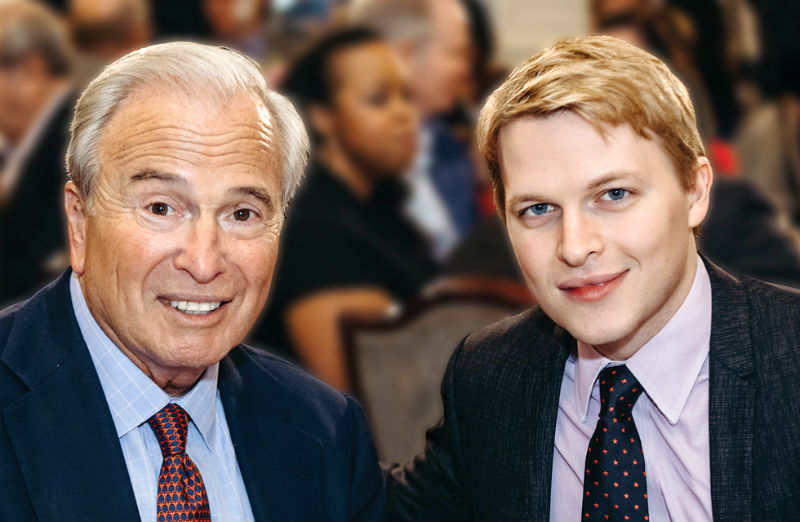The Weinstein Effect: Ronan Farrow and Ken Auletta at The Wallace House

New Yorker journalists Ronan Farrow and Ken Auletta came to the University of Michigan on March 19 to discuss their work in breaking the Harvey Weinstein story. In particular, they spoke about what changed between 2002, when Auletta first attempted to write the story, and 2017, when Farrow succeeded. Farrow and Auletta were here on behalf of journalism powerhouse The Wallace House, and the crowd was full of noteworthy journalists. I waited in a long, snaking line to enter Rackham Auditorium and felt slightly inadequate.
For his writing on Weinstein and other powerful harassers, Farrow, along with The New York Times’ Jodi Kantor and Megan Twohey, won the 2018 Pulitzer Prize for Public Service. The Pulitzer joins a long list of Farrow’s other accomplishments: he graduated (yes, graduated) from Bard College at 15, earned a Yale law degree, worked for the State Department, and wrote the New York Times bestseller War on Peace: the end of Diplomacy and the Decline of American Influence. At some point in there, he also had a cable news show, became a Rhodes scholar, and is currently finishing a PhD from the University of Oxford. Ken Auletta is no slouch either, with 11 books and more than 25 years writing for the New Yorker under his belt. All of this is enough to make anyone feel that their life has been nothing but a pointless meandering of time.
Farrow and Auletta were introduced by three people: Lynette Clemetson, director of The Wallace House, as well as Michigan Daily reporters Nisa Kahn and Sammy Sussman, both of whom have reported on sexual misconduct at the University of Michigan. Farrow and Auletta took the stage and Auletta immediately began to interview Farrow about his reporting process, his views on the #MeToo movement, and his hopes for the future of journalism. Both men were charming and they had an easy, comfortable rapport, even when discussing tough subjects.
What struck me most about the talk is how intent Farrow was on centering the women who told him their stories. No matter what Auletta asked, Farrow turned the conversation away from himself and toward the bravery of his sources. Farrow is concerned with not only the individual men he has reported on but also the larger issue of structural power imbalances that protect such men. Auletta and Farrow agreed that harassers are protected by the immense systems of power built upon years of institutional silence. When Auletta first wrote about Weinstein, in 2002, he heard multiple accusations of rape but was unable to get anyone to speak on the record. Auletta badly wanted Weinstein to be brought to justice for his crimes, and his emotion was clear when he remembered telling Farrow, “My God, you’ve got him,” after Farrow gained access to a recording of Weinstein admitting sexual assault as part of an NYPD sting operation.
Much of the conversation circled around but never quite touched Farrow’s attempt at reporting on Weinstein while he was employed by NBC, which is largely suspected of having killed Farrow’s story and that pushed him to publish it in The New Yorker instead. Farrow demurred when pressed for specifics on this topic: he is currently writing a book about the process called Catch and Kill and didn't want to give too much away. He did state that it was his concern of letting down his sources that kept him reporting, even when he feared both for his job and his life -- Weinstein had him threatened by former Israeli fighters from the intelligence agency Black Cube.
One of the most poignant moments of the night came during the Q&A when Clemetson pointed out that many newsrooms are reluctant to report on accusations of sexual harassment because their own entrenched power systems often hold harassers at the top level. Indeed, Farrow also uncovered patterns of abuse by CBS chief executive Les Moonves and New York state attorney general Eric Schneiderman. Michael Oreskes, head of NPR, also resigned after the Washington Post reported on harassment allegations against him while he was at The New York Times, and Fox News lost a litany of head broadcasters following decades of sexual harassment.
Farrow has spoken on all these topics many times and it shows. His message is polished and eloquent, and he rarely goes off script. He even maintained his calm even when an irate protestor broke into a muddled rant during the Q&A, attacking Farrow both for working for the State Department and for his association with the #MeToo movement, which the protestor described as a “sexual witch hunt” designed to hurt the working class. Farrow was willing to respond to all of the man’s claims, but the protestor stormed out of the building before Farrow had the chance. “Well,” he laughed, “you should see my Twitter mentions.” After Weinstein, it’s clear that it will take more than one angry man to detract from Farrow’s powerful message.
Evelyn Hollenshead is a Youth Librarian at the Ann Arbor District Library.


































